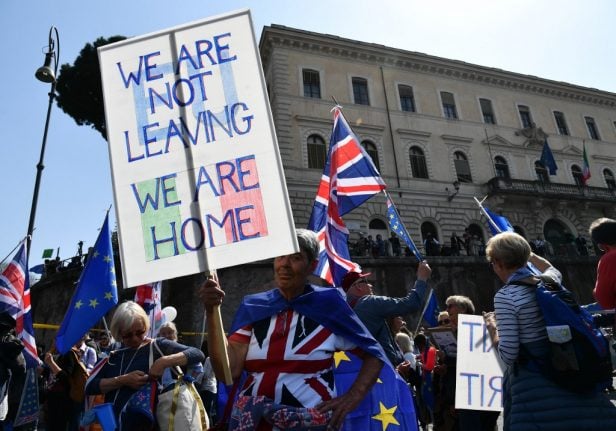It's been so long since the British parliament last debated (and rejected) a possible Wiithdrawal Agreement that many people will have forgotten exactly what it entails.
But after the Conservatives won a landslide victory in the UK's general election, their Brexit deal is back on the table and could finally pass by the proposed deadline of January 31st.
While the latest deal hasn't yet been given the green light by the British parliament, it's important to remember that the Citizens' Rights part of the deal – the 50-odd page section that formed Part Two of the Withdrawal Agreement – remains unchanged from when it was thrashed out a year ago.
READ ALSO: How will Brexit affect you in Italy? Q&A with the British ambassador
The good news is that the transition period, which basically keeps relations between the EU and the UK as they are now, will immediately kick in when the UK leaves and run until December 2020, unless it is extended.
So people who want to move to an EU country but have not made the move yet can come here on the same terms as before until the end of December 2020. And Brits who want to move from one EU country to another can also do so as they would have done if they were EU citizens until the end of 2020.
This contrasts with a no-deal scenario when all such rights would end on Brexit Day.
READ ALSO:
- Brits in Italy: It may be your last chance to apply for residency as EU citizens
- No, marrying an Italian won't save you from Brexit
- Healthcare after Brexit: What do Brits living in Italy need to do?
Here's a quick recap of what the Brexit deal will mean for British residents in Italy (though it's worth noting that at the time campaigners from British in Europe described the Withdrawal Agreement as having “more holes than a piece of French Emmental” cheese).
- If you are legally resident in an EU country then you will have the right to stay, albeit you will have to apply to authorities in order to secure this status.
- The right to stay is not only guaranteed for those already living in the EU on Brexit day, but also those who come to the EU before the end of the transition period, which currently is 31st December 2020 – though there is a chance that the transition period could be extended even further. It was initially intended as a 21-month window in which the UK could organise bilateral deals or with the EU as a whole, but repeated Brexit delays mean it is now just over a year.
- Under the Withdrawal Agreement, Brits will only lose those rights if they spend five continuous years away from the EU country they are living in.
- The current EU laws on the right of residence will apply, meaning Brits in the EU are not obliged to meet any conditions for the first three months of their stay, but after that they must be working or self-employed, self-sufficient or a student. Alternatively they can be a family member of someone who meets these conditions.
- Aggregation of social security contributions is agreed.
- After five years of meeting these conditions then you will earn the right to stay permanently. Anyone with less than five years' residence under their belts by the end of the transition period will be allowed to stay on under the same conditions until they can claim permanent residency.
- Britons in the EU will enjoy the continued right to reciprocal healthcare. So those pensioners who have cover under the S1 scheme or will be eligible for one when they retire will continue to have their healthcare funded by the UK. For British workers in EU countries who pay into the national health scheme then, the rules will remain as they are now.
- EHIC health cards will also continue to cover travel across the EU during the transition period. What happens with them afterwards would be part of any future deals between Britain and EU countries.
- Pensions will be uprated – meaning your UK state pension will be increased annually as it has been for those living in the UK or in the EU up to now – and this continues for your lifetime.
- Disability benefits will also be “exported” as they are now.
- Frontier workers who live in one country and work in another will have the right to continue to work in each country.
- Close family members including spouses, civil partners and dependent children will be able to join you living in an EU country if you are legally resident. British in Europe points out that: “This will apply for the whole of your lifetime. If you have children after the effective date they also are protected under the withdrawal agreement if you and the other parent are also protected or a national of the country you live in.”
- The issue of qualifications being recognised in a country under a Brexit deal is one of the more confusing aspects of the Citizens Rights part of the WA. British in Europe sum it up by saying: “There is some agreement on recognition of professional qualifications – if you have an individual recognition decision re your qualification including through automatic recognition e.g. doctors, architects, your qualification will continue to be recognised but only in the country where the decision was issued.”
Citizens rights group British in Europe said of the deal when Theresa May first agreed it: “It's reasonable to say that for those who are happily settled in their country of residence, work solely in that country, have retired there or are pre-retired, have no wish or need to move to or work or study in another EU country, fulfil all the requirements for exercising treaty rights (see here) and don't rely on professional qualifications, then your rights should be covered.”
But it's not all plain sailing.
-
Residency permits will still have to be applied for if EU countries, as they are expected to do, introduce a “constitutive system”. That means criminal checks will be carried out on applicants as well as checks to make sure they meet the requirements legal residence. That might be a problem if residents don't have the resources to prove they are self-sufficient. Application must be submitted within six months of the end of the transition period (which based on the current end date for the transition period of December 31st 2020 would be June 30th, 2021). And it's only an application, there is no guarantee that all applications will be accepted. After Brexit countries could also adopt a “declaratory system”, meaning Brits won't have to apply for residency permits, but will have a choice whether to do so.
- Freedom of movement ends once the UK leaves the EU, so as well as affecting people who arrive after the end of the transition period it also means people cannot move between countries. So if you have residency sorted in Italy, you cannot then move to Spain for work – for example – without going through the Spanish immigration process.
- The right to provide cross-border services as self-employed people.
- As British in Europe states: “Some professional qualifications e.g. lawyers practising under their home titles and EU-wide licences and certificates are not covered, nor is recognition of qualifications outside the country of recognition/residence across the EU 27.”
- If you hook up with a local while you're living in an EU country, don't assume that they will be able to live with you in the UK after the end of the transition period, even if you are married.
And of course, all this depends on Boris Johnson convincing MPs to back the deal he has negotiated.
For more information on the citizens' rights section of the Withdrawal Agreement, you can visit the British in Europe website.



 Please whitelist us to continue reading.
Please whitelist us to continue reading.
Member comments